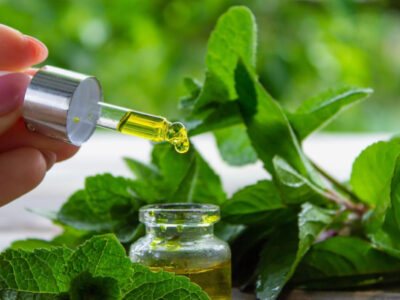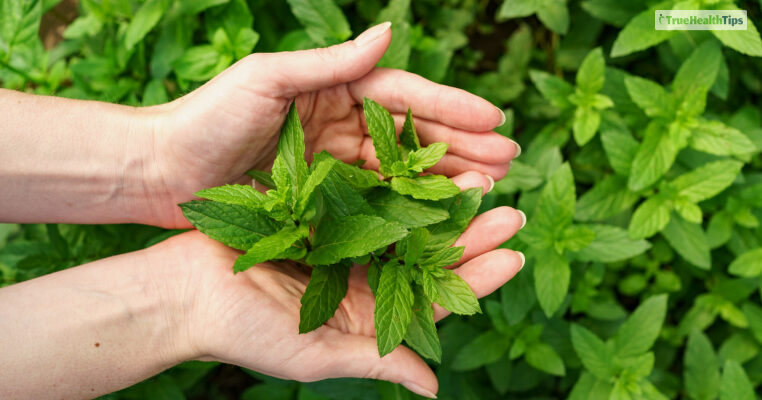
Benefits of Tulsi were all the rage in the recent years around the pandemic. Tulsi or the Holy Basil. Who hasn’t heard of this super herb? It became popular around the time Covid was populating (or over-populating). The herb has been a staple in Asian countries, specifically the South Asian countries such as India and Sri Lanka and neighboring regions such as China.
The ancient texts of these regions show a strong use of herbs in medicine, recording as far back as a century.
As someone who is always looking for healthier, sustainable alternatives to everything, I have been using Tulsi as a remedy for colds and flu. With its cold-fighting characteristics (we’ll get into that in a bit), I have seen a great change in the duration of the cold.
Read on to reap the benefits like me. Let’s dive right into it!
How Is Tulsi Helpful For Human Life?
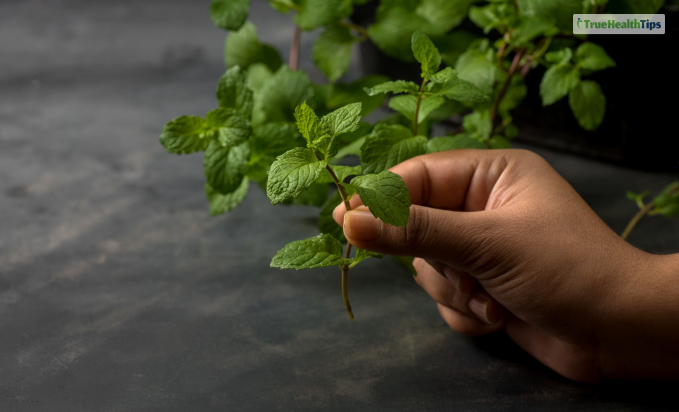
Ocimum sanctum or Ocimum tenuiflorum are species shown to have the most benefits for humans. The Tulsi can be of two types:
- Rama Tulsi, it has light green leaves and is also known as sweet Tulsi
- Shyama Tulsi has dark-colored leaves, mainly purple. It is not common for consumption.
The active ingredients present in Tulsi include:
- Ursolic acid
- Eugenol
- Beta-caryophyllene
- Linalool
- 1,8- cineole
Thus, the holy basil has rightly earnt the title of “The Elixir of Life,” among other justifiable names such as “Queen of the Herbs” and “Liquid Yoga.” Moreover, as per the Journal of Ayurveda and Integrative Medicine, we now know that herbs such as Tulsi can solve the diseases of modern life.
The science of life, as the journal calls it, has on its side the oldest medical system—Ayurveda. This system provides a holistic approach to life. It focuses on promoting good health and preventing diseases through practices that amplify healthy lifestyle practices.
The practices include eating food that is natural, has the least amount of processing done, fresh produce, and the use of Rasayanas or formulas that eradicate diseases.
This would help detoxify your body and enhance its ability to maintain balance through various stressors. Tulsi is a culinary herb, but other herbs cannot surpass the benefits of Tulsi.
Adaptogens support the body’s ability to respond effectively to stress, fatigue, and anxiety. Benefits of Tulsi includes it being a great adaptogen scientifically proven to increase consumers’ energy. This helps them manage emotional and physical stress.
Thus, the Queen of the Herbs can support the overall wellbeing of an individual consuming Tulsi within permissible limits. I say this because too much of anything is known to be harmful, Tulsi is no exception.
Physical Health Benefits of Tulsi
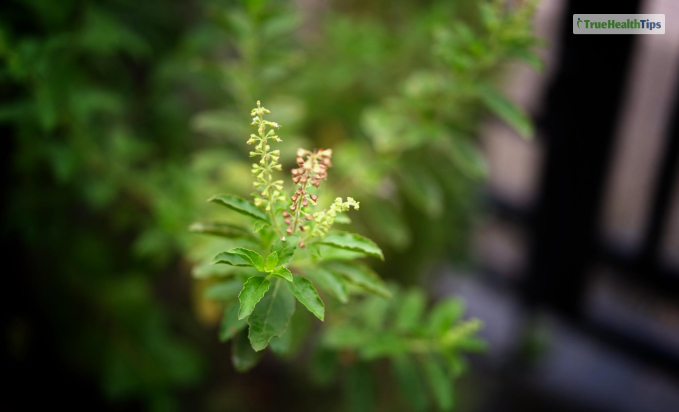
So far, you would have gotten the idea of how many benefits of Tulsi exist for humans. The following list is for you to know how the herb benefits our health in various ways. Follow along to know more:
Metabolic Benefits
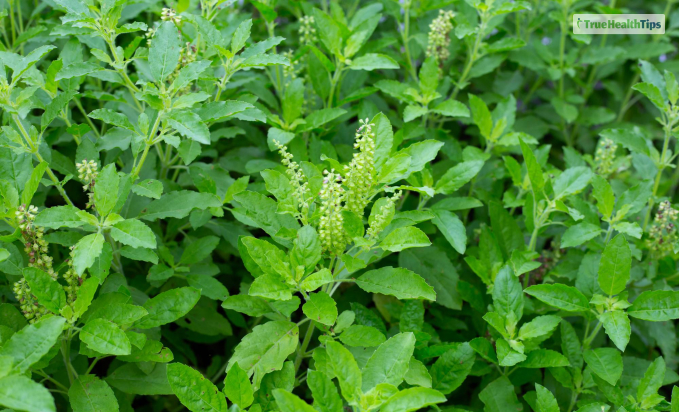
Our body’s metabolic system maintains a balance between nutritious and poisonous substances. The various systems work in sync to maintain homeostasis, which is the balance the opening line talks about.
Lowering blood sugar
One of the most essential parts of homeostasis is maintaining blood sugar levels. Tulsi promotes the various hormones that play a part in glucose homeostasis. The holy basil plant helps reduce blood sugar as it helps prevent diabetes symptoms such as weight gain and the presence of excess insulin in the blood.
However, you must exercise caution in the simultaneous use of medications for blood sugar and Tulsi. If you continue the use of both substances parallelly, you may risk lowering your blood sugar more than necessary.
Improving good cholesterol levels
One of the major contributors to the “modern diseases,” cholesterol levels, especially the ‘bad’ cholesterol levels, can cause cardiovascular risk. Tulsi helps promote the levels of good cholesterol by combating metabolic stress. How does this help in improving cholesterol levels? The active ingredients in the herb can change the fat molecules, which helps lower LDL (bad) cholesterol and promote higher HDL (good) cholesterol.
Special mention is for eugenol, which helps lower cholesterol levels that have stress as a trigger. Moreover, there is a total reduction in the cholesterol levels in important organs such as the kidney, heart and liver.
It is worth noting that these findings have been in rats and rabbits that were used in studies investigating the benefits of Tulsi.
Maintaining blood pressure
The herb has shown positive effects on blood pressure in clinical trials involving human participants. With its effect on preventing weight gain, the herb shows positive effects on blood pressure.
Decreasing inflammation
Inflammation is an immune system response to any toxic substance that enters the body or to an injury. Cell damage can also lead to inflammation, which can be painful for the individual experiencing it. One prominent example is arthritis, which is a chronic inflammatory condition in which an individual experiences discomfort in the joints.
Reap the anti-inflammatory benefits of Tulsi while simply sipping a cup of tea made with its leaves. People with fibromyalgia and arthritis can benefit from the use of Tulsi as well.
Thus, we can curate a list of conditions that this herb benefits:
– Diabetes
– High cholesterol
– Obesity
– Arthritis
– Fibromyalgia
Mental Health Benefits
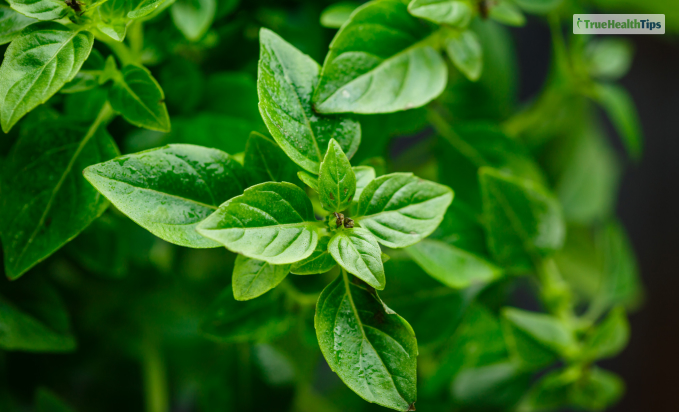
This herb is basically the MVP of stress relief. Apart from the effect of active ingredients, the aesthetic appeal of the herb is quite helpful, too. The aesthetic appeal of an herb? What am I going on about? Well, the green leaves of Tulsi have a soothing effect on our minds, which can help us calm down.
Even if you do not consume the herb, it can visually benefit you by calming you down. Psychologically, it is proven that colors have a positive impact on humans. Green signifies calm and peace, among other colors.
The compound linalool in Tulsi imparts a citrusy smell that acts as a relaxant, thus providing a soothing effect.
Similarly, there are several benefits of the Tulsi herb, be it through visual or oral consumption.
Neurocognitive and mood conditions
The effect of Tulsi on human mental health is known through its stress-relieving and mood-enhancing effects. The various active ingredients listed in the section above play a key role in improving mood conditions.
This may be its adaptogenic benefits, which are good for conditions such as anxiety, stress, and fatigue. One of the major contributions to alleviating these conditions is through its mind-altering and mood-enhancing properties.
Unlike agonistic psychoactive substances such as nicotine and caffeine that can form a scheduled addiction, the regular use of Tulsi does not have this detriment.
Apart from these, the overall effect of the active ingredients is beneficial for the body’s response to anxiety, stress, and fatigue. This helps in managing the emotional and physical stress that one experiences in day-to-day life.
Immune System Benefits
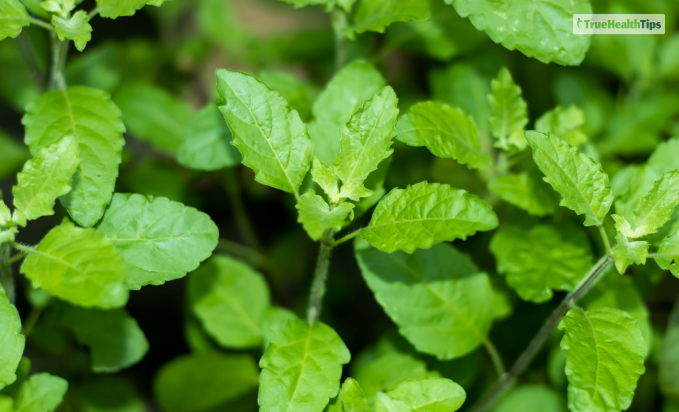
One of the most used herbs during the COVID-19 pandemic was Tulsi. This herb has natural oils (refer to active ingredient list) that provide antimicrobial action. This helps in combating the triggers for the immune system. Infections or substances that can irritate the immune system enough to elicit a response are effectively brought under control with the help of Tulsi.
Immunity and Infections
Eugenol is one of the primary natural oils that has beneficial effects on its consumers. The anti-inflammatory property of eugenol helps calm the immune system, which is useful in controlling conditions where inflammation can cause severe immune responses.
There are also suggestions of the herb being used for isolating active compounds (Ursolic acid) that can protect against viral infections such as SARS-CoV-2.
A study found significant immunomodulatory role of Tulsi in adults. This herb was shown to increase the immune response in adults, which protects them from infections and inflammatory conditions.
Summarizing
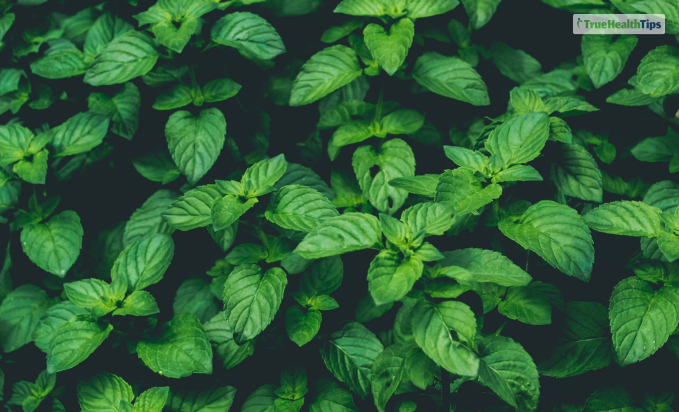
Tulsi or Holy basil is good for the general wellbeing and overall health of humans. The herb is known to provide relief from stress, fatigue and even help with mood disorders. The neurocognition enhancing property of the herb helps in improving concentration.
Moreover, modern-day diseases due to the increase in sedentary lives and pollutants cause many conditions. These may be obesity, diabetes, or mood disorders such as anxiety and depression.
This indicates how the herb is helpful in leading an overall healthy life despite being exposed to pollutants and irritants that can trigger the immune system.
Safety Precautions
It is important to note that everything must be consumed in moderation. This includes supplements be it natural or synthetic and any drugs that are recommended by the physician.
Studies have shown that daily use of Tulsi is not only beneficial for overall health, but also safe. There isn’t a specific dosage that you can follow, however, if you are consuming whole leaf, then 1-2 leaves a day are enough.
If you are using a Tulsi supplement, for example, drops or Tulsi leaf powder, consult your healthcare provider for an appropriate dosage. Moreover, it is best to avoid the supplement if you are pregnant or breastfeeding.
Bonus!
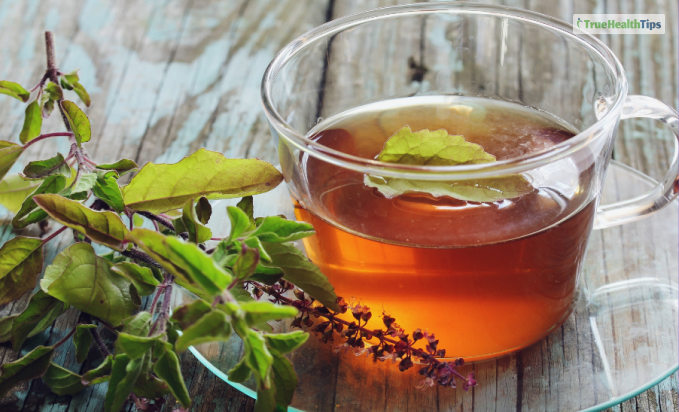
How to make Tulsi tea?
- Take fresh Tulsi leaves (3-4)
- Pour boiling water over the leaves and brew for 5-10 minutes
- Strain off the solids and drink the liquid.
You can even add the leaves with other ingredients to make a concoction that is beneficial for cold and flu. This concoction has the following ingredients:
- 4-5 Tulsi leaves
- 1 Clove
- Ginger – 1 tsp
- Crushed black pepper – 1 tsp.
- 1 tsp Honey or Jaggery (whole or powder)
How to make this Ayurvedic magic potion:
- Heat a saucepan with water and add the dry ingredients.
- Occasionally stir for 30 seconds to 1 minute till the mixture boils.
- Strain the liquid and enjoy after adding honey or jaggery.
Wrapping It Up!
In conclusion, benefits of Tulsi justify its title of The Elixir of Life also due to its zero harm. Even with daily consumption in adequate quantities, you do not have to fear addiction such as those with caffeine. This comparison is due to the ‘active’ effect of the compound. However, this proves to be detrimental in the long run.

